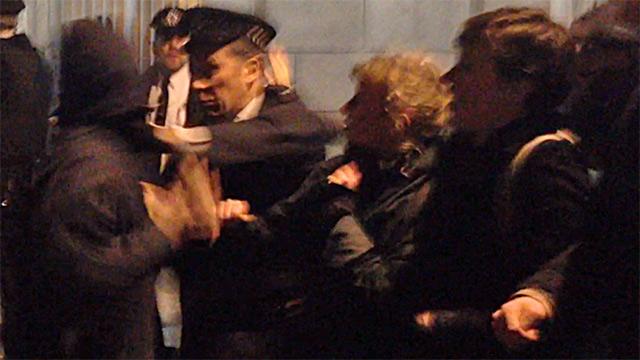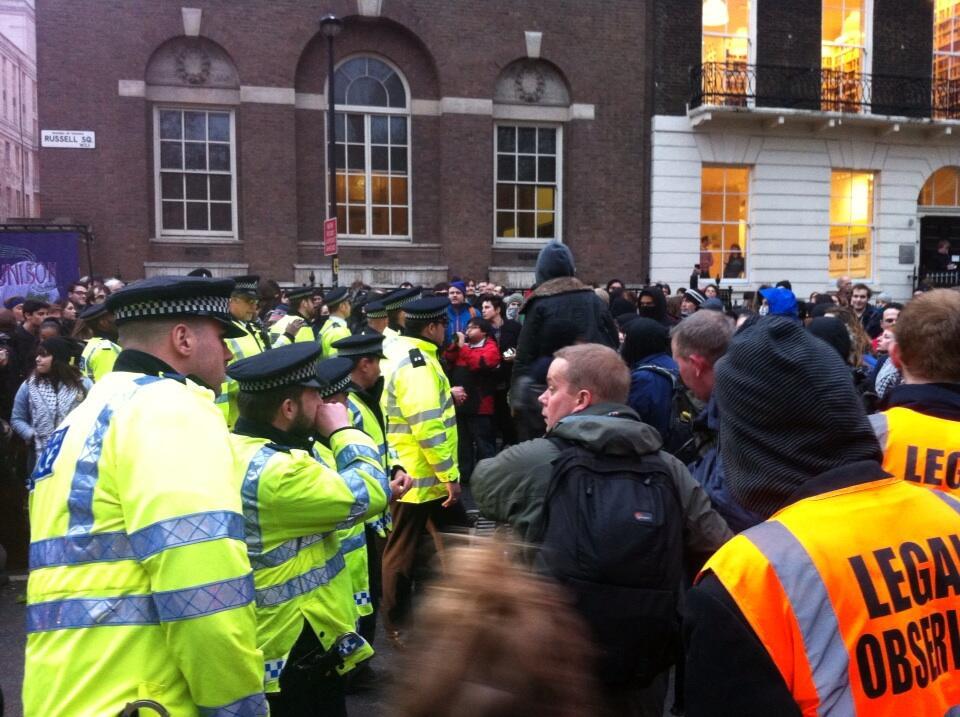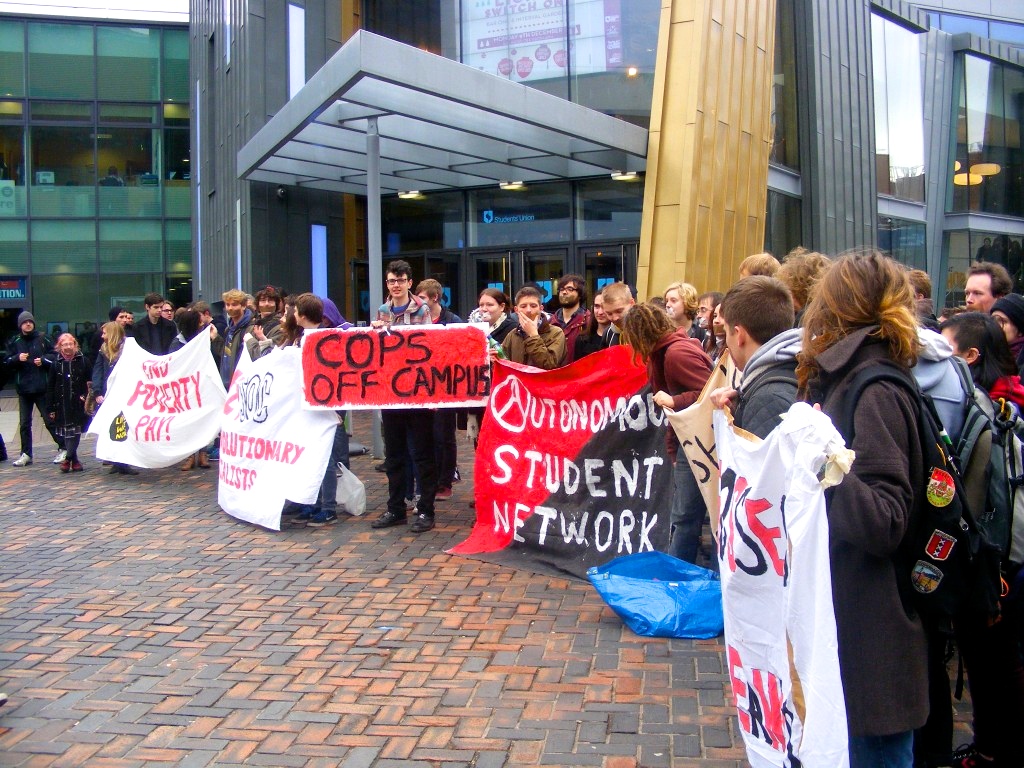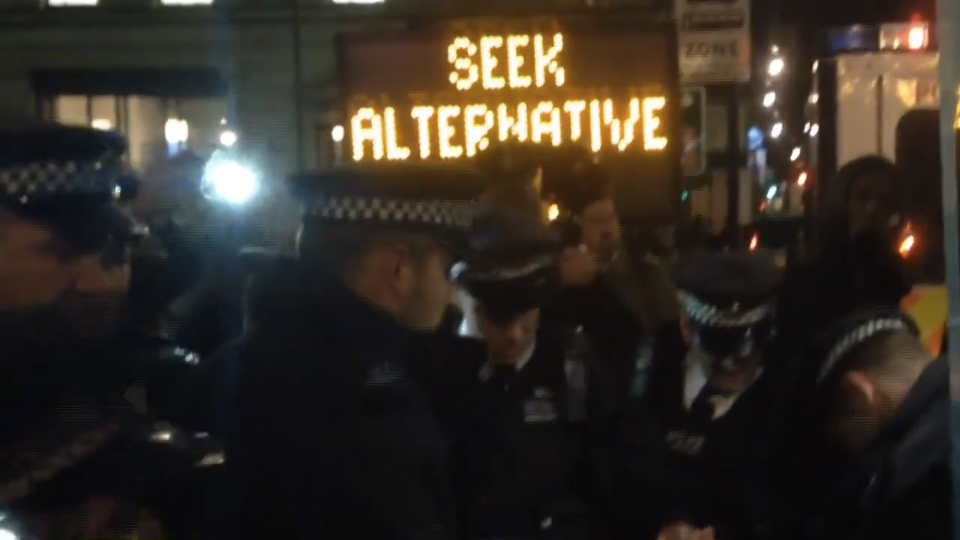Video footage recorded in London last week, on December 4, shows one woman running away being tossed to ground (above) and another of a policeman punching a student in the face. “Without provocation and while he was turning away, the policeman just went for him," said Adam Barr, a student of history and Chinese at University of London's School of Oriental and African Studies (SOAS), who witnessed the incident.
"Later another friend was dragged down some steps," he added. The cops were out of control right from the outset — like the security, who violently dragged the students out of the building and deposited them right in front of the police.”
Last week's occupation of University of London's vice chancellor's office by 100 students was evicted by security guards working alongside police. The next evening, a "Cops Off Campus" demo that had been organized before the occupation attracted far more people than organizers expected, due to the violence in which police aggressively arrested 38 young protesters.
The students went further, calling another protest for the following day and a national day of action for Wednesday of this week. “The way the police and security worked in tandem to evict the occupation shows the collusion between the management and the authorities,” said an English literature student named Sam.
“More broadly, it shows how violence is built into austerity; any large scale protest or dissent that threatens the neoliberal agenda is met with police violence.”
The occupation was undertaken with multiple demands. A key issue was the undemocratic manner that university decisions are made. “Since 2010 the universities have been pushing the government’s austerity agenda,” said SOAS student Maham Hashmi, who was engaged with mass student mobilizations in 2010 against a massive hike in fees.
“Not only do they refuse to speak with us about these issues, they serve injunctions and ban protests where we can voice our concerns,” Hashmi said.
Among the occupation’s demands, the students are calling on the University of London to abandon its plans to shut down University of London Union (ULU). The largest student union in Europe, it represents students at all the institutions within the university.
“The plan to shut ULU down has been done without any discussion,” stated Tom Oliver, a politics student from SOAS. “Their rationale is economic efficiency.”
ULU's building played a role after both Cops Off Campus demos, providing a safe haven where the students could meet and arrange support for those arrested. In contrast, other London campuses shut the doors and locked the gates, leaving students out on the street in the face of violent police armed in riot gear.
One issue that has galvanized many students alongside staff is the campaign to bring outsourced workers in-house and grant them sick pay, holiday pay and pensions. One of the demands forwarded during the Senate House occupation, it will also be included within this week's national day of action.
Another key argument of the occupation is that government should not privatize past students' loans. In the streets, among those who supported the occupation and both Cops Off Campus protests, I spoke with academic and Occupy supporter David Graeber about the government plan.
“Originally, when they first gave out student debt they made it sound like a very liberal system. They told people if you don’t earn that much you won’t have to pay it. So this made it seem palatable," said Graeber.
"However, this was part of the change in education — from having a right to it to privatizing it.”
Graeber continued, “It was really a conceptual trap, where people thought not much would change. Yet once they got rid of the right to education, the idea of market forces slip in as the next logical steps.”
I asked whether he thinks the private companies will honor the terms originally promised to the students. “Of course not,” he said, laughing. Graeber expressed enthusiasm about the fresh momentum the protests had provided Britain's student movement.
“I didn't suspect so many people [would come] out at each protest. People have gone out knowing they may get their teeth knocked out or sent to prison, yet they still keep coming out,” he said.
“At the moment, this whole week has been so inspiring, building on Sussex. In the future, Sussex will be remembered as the point when this new wave student movement began — when the key question was raised about whether universities are communities or businesses.”
At Sussex on Britain’s south coast, five students so far have been suspended indefinitely for engaging in the lawful protests and occupation against university privatization and cuts.
Hashmi said he expected the national day of action on Wednesday to be well attended nationwide. At Birmingham University, in Midlands, students have occupied a building in the face of a ban. Additionally, in Edinburgh, Scotland, anger has arisen over two students who werearrested without official reason while Princess Anne was visiting their university.

Furthermore, anger at police has grown since the arrest of the ULU student union’s vice president, who challenged police for racially targeting ethnic minorities with stop-and-searches for drugs.
Like Graeber, Hashmi and Barr were all involved in the student mass mobilization in 2010. Comparing the event then with now, Barr explained that the movement has embraced a more horizontal organizing process. “We are using far more consensus – and I think that has come from people involved in Occupy. This means the movement is broader and deeper," he said, "meaning people feel even more empowered.”
“We are seeing a massive surge in new students getting politically active — and global events such as Tahrir Square, Turkey, Brazil and Occupy have encouraged this to happen," said Hashmi. "Now, since all the attacks on universities across Britain, students are saying, 'This is our space, the police violence is unacceptable, we have to resist.'”
Reflecting on 2010, Graeber said the mass protests then were unlike anything he had ever seen. “It was amazing because it was based on principles and attacked the fundamental drive of the government, but also it was selfless, fighting for the future students’ fees and therefore fighting for an education as a public good,” he said.
Graeber said he wasn't surprised when 2011 grew more quiet, but by 2012, he recalled, "I was worried. There was a consumerism air coming into universities – people seemed defeated.”
Now, looking forward, Graeber thinks the students can take their principles even further through mass actions. “The new wave is on the offensive. It’s not that we’re trying to say you cannot fuck us over — they’ve already done this," he said.
"Now it is time to choose our aims to be something we want. Now we could start looking at building a free education movement.”

3 WAYS TO SHOW YOUR SUPPORT
- Log in to post comments













